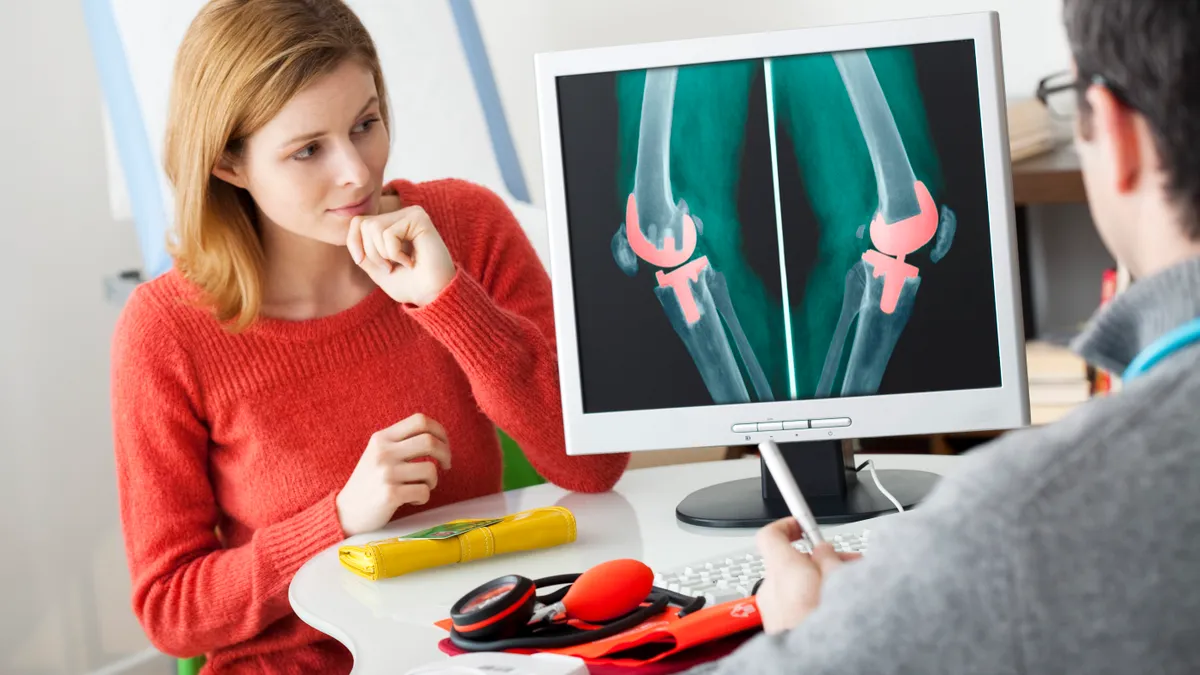Dive Brief:
- Stryker said its Mako robot continued to gain traction in orthopaedic surgery, contributing to an 8% growth rate in sales of the company's knee replacements in the third quarter.
- A small study published in the Bone & Joint Journal showed patients who received knee replacements using the Mako robot had less pain, better early functional recovery and shorter hospital stays compared with conventional surgery, Stryker said.
- The Kalamazoo, Mich.-based company reported overall third-quarter organic sales growth of about 8%, boosted by continued strength in its neurotechnology and spine businesses, and raised its full-year forecasts for both sales and adjusted earnings per share.
Dive Insight:
The Mako system for robot-assisted orthopaedic surgery, which Stryker acquired in 2013, is becoming a significant growth driver for the medical device maker. On the earnings conference call, company executives gave a detailed update on progress with the robot’s adoption.
Katherine Owen, vice president of strategy, said the company installed 37 robots globally in the quarter, with 26 in the United States, compared with 33 globally, including 23 U.S. installations, a year ago.
"We are now approaching 600 robots globally and continue to feel bullish about the future of robot-assisted surgery," Stryker CEO Kevin Lobo said on the call.
U.S. Mako total knee procedures in the third quarter were about 11,300, bringing the year-to-date total to more than 30,000. All Mako procedures topped 18,700 in the quarter. In addition, about 145 surgeons were trained to perform total knee procedures with the robot, bringing the number trained since the system’s launch to about 1,350.
Stryker officials said the small study comparing 40 patients who received knee replacements via Mako and 40 whose procedures were performed through conventional arthroplasty, all performed by the same surgeon, showed better outcomes with the robot.
In a separate paper published by the Hip and Knee Society comparing costs of Mako-assisted and conventional knee surgery for a 90-day episode of care, researchers found a $2,391 cost savings with Mako, the company said. The Mako patients had a 90-day hospital readmission reduction of 33%.
Overall in the third quarter, Stryker reported its net sales increased 7.9% to $3.2 billion. Net profit of $590 million, or $1.55 per share, rose 36%. Among the company's divisions, neurotechnology and spine sales increased 17.4%, MedSurg sales increased 9.5%, and orthopedic device sales increased 4%.
Stryker said its full-year organic net sales growth, excluding the impact of a new revenue recognition standard, would be at the high end of the range of 7.0% to 7.5%, and it now expects adjusted earnings per share to be in the range of $7.25 to $7.30. It previously forecast 2018 adjusted earnings in a range of $7.22 to $7.27 per share.
In August, Stryker announced plans to acquire K2M Group Holdings, a maker of devices used in complex spinal fixation and deformity procedures, for about $1.4 billion, to bolster its spine offerings. Earlier this month, Stryker re-filed its pre-merger notification with the Federal Trade Commission and Department of Justice to allow more time for review of the proposed deal, following two shareholder lawsuits challenging the merger. But the lawsuits have since been dismissed.
Stryker this week also completed its acquisition of Invuity, an advanced photonics and surgical lighting company, for $189.6 million.










